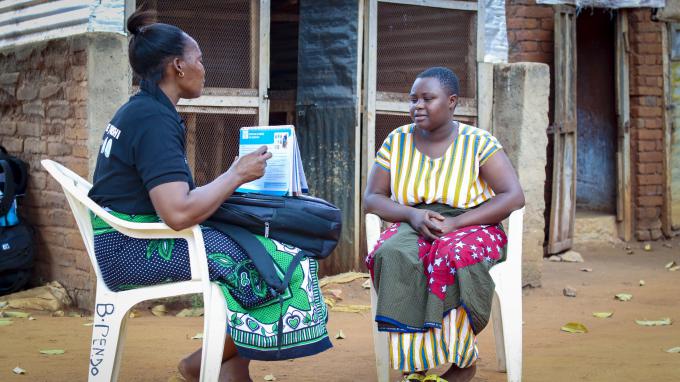Breaking Through Misconceptions Yasinta*’s Journey to Embracing Family Planning

Yasinta*, a twenty-year-old first-time mother, resides in the village of Mlali ,Kongwa district of Dodoma region. When Yasinta* was just eighteen years old, she gave birth to her first child, Paul*. At that time, she lacked essential knowledge about reproductive and maternal health and accurate information on available birth spacing options where . she had no idea on how to delay having another child before she was ready. That was until she crossed paths with Rose, a dedicated Community Health Worker (CHW) working under the Connect project.
"I got pregnant at a young age, and I didn't know anything about using family planning methods," Yasinta* says.
Rose, a dedicated Community Health Worker (CHW), had been working diligently under the Connect project. When Rose first approached Yasinta* to provide education on family planning, Yasinta* was initially worried due to the prevailing cultural and community beliefs that cast doubts on the safety of such practices.
"At the beginning, it was difficult to be accepted in providing family planning education because Yasinta*'s parents thought that I was teaching inappropriate things in the community. Additionally, some people believed that using family planning methods could result in giving birth to a child with disabilities or brain abnormalities," Rose says.
However, after several trials by Rose, Yasinta* agreed, and after receiving thorough education and guidance from Rose, Yasinta* not only accepted the concept of family planning but also enthusiastically embraced its methods. To her surprise, none of the feared adverse effects materialized, contrary to what she had been told by others.
"When I started using family planning methods, I didn't experience any harm as I was initially told. Up to now, I continue to use them without any issues," Yasinta* says.
Since then, Yasinta* has become a beacon of knowledge, sharing her newfound wisdom with four other individuals who, like her, had previously been misinformed about family planning. Her passion for educating others about this vital topic knows no bounds.
"Until now, I have educated five of my friends who also believed that family planning methods have harmful effects. So far, they are using them and acknowledge that they haven't faced any challenges," Yasinta* added.
Yasinta*'s own mother, deeply grateful for her daughter's newfound knowledge in family planning and child-rearing, has also joined the effort to educate others. Although she had never personally used family planning methods, she now imparts the invaluable information passed down by her daughter Yasinta*. She has become a resourceful educator, directing people to seek accurate information, often suggesting they consult Rose, the CHW, for more comprehensive guidance.
"Through the family planning education my daughter received, I've been teaching some people. When they need to know more about family planning methods, I tell them to go to Rose to learn more because she is more knowledgeable," Yasinta*'s mother said.
In this small village of Malali, the ripple effect of knowledge has begun to change lives for the better, thanks to Yasinta*'s transformation and her commitment to sharing what she has learned. The community is gradually shedding its reservations about family planning, embracing a brighter and more informed future, all because of the tireless efforts of individuals like Yasinta* and the invaluable guidance of dedicated CHWs like Rose.
Save the Children, played a crucial role in Yasinta*'s journey through the Connect project. This initiative reached a total of 3498 first-time mothers with postpartum family planning education through community support groups and home visits. Up to December 2023 over 538 first-time mothers, including Yasinta*, adopted family planning methods after referral to health facilities by CHWs funded by the project. These CHWs continue supporting others, dispelling myths and assisting mothers in navigating family dynamics related to decision-making.
In Tanzania, Save the Children's Connect project, aims to increase postpartum family planning among first-time parents between the age of 15 to 24. Collaborating with the USAID-funded Lishe Endelevu project, Connect developed, tested, and scaled enhancements to community-based social and behavior change activities. These enhancements involve facilitating CSGs with PPFP and nutrition education and household visits led by CHWs, using a structured job aid to counsel first-time parents and families.
Save the Children lead the evaluation of these enhancements. Tested in twenty-five villages of Kongwa District, the project revised tools and strategies based on implementation learning, and scaled up the approach to additional villages in Kongwa and Bahi district layering onto USAID Lishe Endelevu project. The Connect project represents a collaborative effort addressing key barriers to access and uptake postpartum family planning among adolescent and young first-time mothers in Tanzania.
 Tanzania
Tanzania